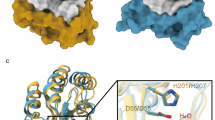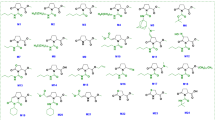Abstract
The antimicrobial arsenal of plants is thought to consist mainly of secondary metabolites, among which the phytoalexins are the best-studied1–3. But plants may also possess antimicrobial proteins4,5: it has been reported that wheat-germ agglutinin, a chitin-binding lectin from wheat embryos, inhibits growth of the fungus Trichoderma viride4. This has led to the notion that plant lectins, with their intriguing biochemical similarity to animal antibodies, have an antibody-like antimicrobial function4,6,7. We report here that the main proteinaceous inhibitor of fungal growth in bean leaves is chitinase, an enzyme that can be induced by the plant hormone ethylene, or by pathogen attack. Among commercial preparations of purified chitin-binding lectins (from wheat germ, tomato, potato, pokeweed and gorse), only those containing contaminating chitinase activity inhibit fungal growth. Our data indicate that plant chitinases, but not chitin-binding lectins, are important antifungal proteins in plants.
This is a preview of subscription content, access via your institution
Access options
Subscribe to this journal
Receive 51 print issues and online access
$199.00 per year
only $3.90 per issue
Buy this article
- Purchase on Springer Link
- Instant access to full article PDF
Prices may be subject to local taxes which are calculated during checkout
Similar content being viewed by others
References
Bell, A. A. A. Rev. Pl. Physiol. 32, 22–81 (1981).
Bailey, J. A. & Mansfield, J. W. (eds) Phytoalexins (Halsted, Wiley, New York, 1982).
Darvill, A. G. & Albersheim, P. A. Rev. Pl. Physiol. 35, 243–275 (1984).
Mirelman, D., Galun, E., Sharon, N. & Lotan, R. Nature 256, 414–416 (1975).
Roberts, W. K. & Selitrennikoff, C. P. Biochim. Biophys. Acta 880, 161–170 (1986).
Sequeira, L. A. Rev. Phytopathol. 16, 453–481 (1978).
Etzler, M. E. A. Rev. Pl. Physiol. 36, 209–234 (1985).
Barkai-Golan, R., Mirelman, D. & Sharon, N. Archs. Microbiol. 116, 119–124 (1978).
Brambl, R. & Gade, W. Physiologia Pl. 64, 402–408 (1985).
Boller, T. in Cellular and Molecular Biology of Plant Stress (eds J. L. Key & T. Kosuge), 247–262 (Liss, New York, 1985).
Molano, J., Polacheck, I., Duran, A. & Cabib, E. J. biol. Chem. 254, 4901–4907 (1979).
Pegg, G. F. & Young, D. H. Physiol. Pl. Pathol. 21, 389–409 (1982).
Boller, T., Gehri, A., Mauch, F. & Vögeli, U. Planta 157, 22–31 (1983).
Mauch, F., Hadwiger, L. A. & Boller, T. Pl. Physiol. 76, 607–611 (1984).
Métraux, J. P. & Boller, T. Physiol. molec. Pl. Pathol. 28, 161–169 (1986).
Bloch, R. & Burger, M. M. Biochem. biophys. Res. Commun. 58, 13–19 (1974).
Farkas, V. Microbiol. Rev. 43, 117–144 (1979).
Author information
Authors and Affiliations
Rights and permissions
About this article
Cite this article
Schlumbaum, A., Mauch, F., Vögeli, U. et al. Plant chitinases are potent inhibitors of fungal growth. Nature 324, 365–367 (1986). https://doi.org/10.1038/324365a0
Received:
Accepted:
Published:
Issue Date:
DOI: https://doi.org/10.1038/324365a0
This article is cited by
-
Remote loop evolution reveals a complex biological function for chitinase enzymes beyond the active site
Nature Communications (2024)
-
Characterization of an antifungal β-1,3-glucanase from Ficus microcarpa latex and comparison of plant and bacterial β-1,3-glucanases for fungal cell wall β-glucan degradation
Planta (2023)
-
Transcriptome analysis of Auricularia fibrillifera fruit-body responses to drought stress and rehydration
BMC Genomics (2022)
-
Protein Elicitor EsxA Induces Resistance to Seedling Blight and PR Genes Differential Transcription in Rice
Rice (2021)
-
Biocontrol of Cladosporium cladosporioides of mango fruit with Bacillus atrophaeus TE7 and effects on storage quality
Current Microbiology (2021)
Comments
By submitting a comment you agree to abide by our Terms and Community Guidelines. If you find something abusive or that does not comply with our terms or guidelines please flag it as inappropriate.



